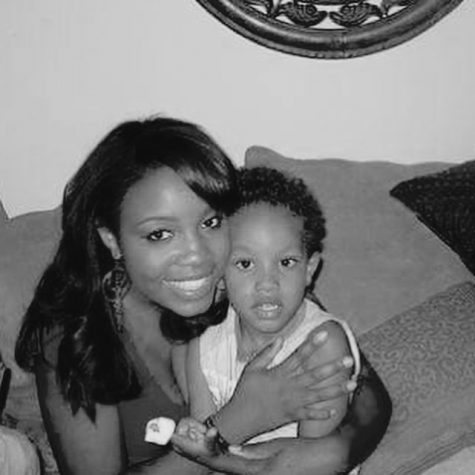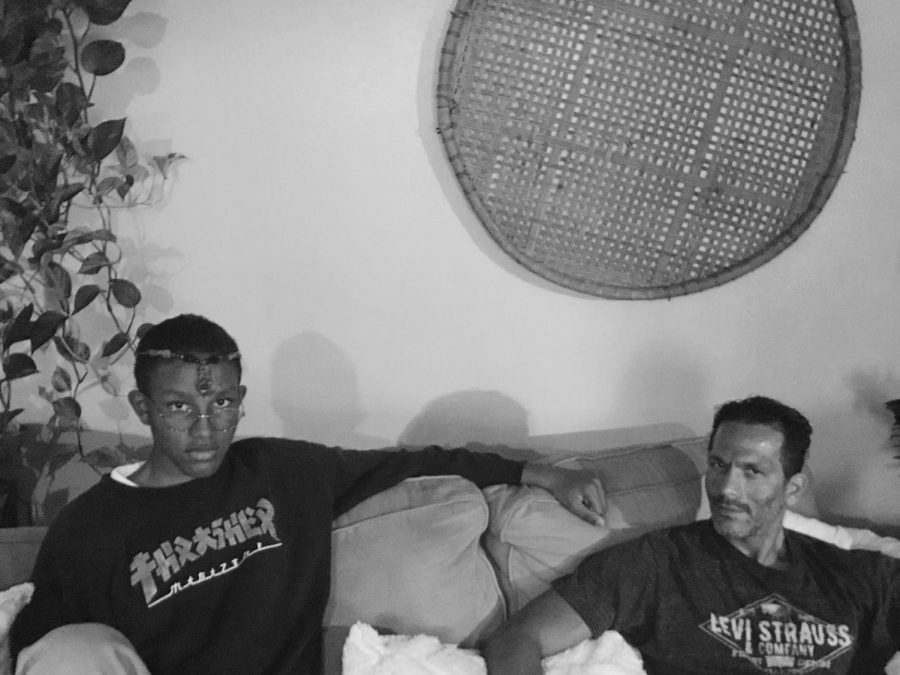Breaking down the system: Racist policing
Davis and Sterling discuss raising their son in a racially biased world
Joshua and Kevin Sterling pose for a photo at Dawn Davis’ house. After his mother and father made fun of his birth stone necklace, Joshua decided to wear it on his head. Photo courtesy of Joshua Sterling
In the aftermath of George Floyd’s death in late May, Black parents had to once again confront a harrowing truth: Their child’s name could be the next featured in a tragic headline.
To avoid the same pain that struck the families of Floyd, Breonna Taylor and Elijah McClain, Dawn Davis and Kevin Sterling gave their son Joshua Sterling, a senior, “the talk,” a grim yet necessary discussion among Black families on how to act during an encounter with the police.
According to Joshua, the slightest irregularity in an African American’s behavior could mean the difference between life and death.
“There are certain things you need to do as a Black person in this country when you encounter a police officer. I was taught to follow whatever an officer tells me to do. If I don’t have the papers in my hands and he asks me to get them, I have to tell him to get those items for me so he doesn’t think I have a weapon and I get shot,” Joshua said.
While “the talk” may seem like a singular occurrence, it is a discussion that commonly arises in Joshua’s family, especially between him and his mother.
“I’m constantly reiterating to him that it’s important to be careful, pay attention to his surroundings and be respectful to cops. I always explain to him what he needs to do when he gets pulled over by the cops, what he needs to say and how he needs to say it,” Davis said. “As a parent, it feels like you’re raising your kids to send them off to war.”
Not only is a Black person five times more likely to be stopped without a reasonable cause than a White person, but a Black man is twice as likely to be stopped without a reasonable cause than a Black woman, according to the NAACP. Recognizing that both he and Joshua are on the adverse side of this statistic, Sterling emphasizes the intersectionality of their race and gender to his son.
“I say to him, ‘Look, you got to realize that basically because you are a minority, and you are a man, that you are at a higher risk of something bad happening between you and the police than anyone else.’ I wouldn’t have that conversation if he wasn’t a Black man,” Sterling said.
For Davis and Sterling, their individual experiences with the police fuel their concern for Joshua.
In the early 2000’s while driving a Cadillac Seville alongside his then-girlfriend Davis, Sterling was pulled over and asked to step out of his vehicle without reason. He complied and got out of the car, only to be pinned and handcuffed against the hood of the Cadillac.
According to Davis, the police were “rough” in their procedures.
“Being very young at the time, I was very vocal about what I was seeing and how much I didn’t like it. I let the cops know that what was happening wasn’t right, but they kept insisting that there was something wrong,” Davis said.
A long series of accusations followed—he had a criminal record, he had a warrant out for his arrest, he was driving a stolen car—all of which were untrue.
“I knew [the accusations] were false. [Joshua’s] dad knew they were false,” Davis said. “Once we realized all of it was false, we knew it could go a lot of different ways.”
While driving the Cadillac, Sterling was pulled over 10 times over the course of two years.
“For whatever reason, prior to this car, I drove a Toyota and hardly ever got pulled over. The Cadillac and the color of my skin were attributable to this happening,” Sterling said. “Does unfair treatment happen against the minority community from the police? Without question it does. Luckily for me, I kept my cool and these guys weren’t so unfair and racist. This could have turned out way worse, and I’m lucky these incidents didn’t result in some of these tragic stories you’ve heard.”
While Cadillac Sevilles are known as cars “popular among gang members,” according to Sterling, many luxury vehicles driven by Black individuals are targeted by the police. Due to this trend, Davis avoids purchasing from high-end car brands.
“I don’t own certain types of cars. The car that I own now is borderline for me. I am not the only Black person who thinks like this. African Americans know, in our circle, that you don’t buy certain cars because you’re more prone to being pulled over. Ultimas are typical cars Black folks are pulled over in. Cadillacs, Range Rovers, BMWs. If you didn’t know, now you know, and don’t tell anyone I told you,” Davis said.
Although her own encounter with the police wasn’t motivated by the brand of the car she drove, Davis believes her race played a factor in how the event unfolded. Slammed on the hood of her lowered Honda Civic after being pulled over by a Signal Hill police officer, she was aggressively dealt with in an experience that would stay with her for life.
“[The officer] was pushing, pulling and tugging on me and kept saying ‘Stop resisting.’ I wasn’t resisting. It was the way he was handling me. He let me go, and it ended up being fine, but just the thought that he was playing those games with me was scary,” Davis said. “To this day, I hate driving in Signal Hill.”
To this day, both Davis and Sterling carry the memories of their police encounters, affecting the way they view the police in even the most tame of moments.
“I’m not relaxed, that’s for sure. I’m very conscious of the impression I may give. I’m not scared to my wits end that something bad might happen, but I’m definitely alert and conscious around them,” Sterling said. “Unfortunately, I trust them less. Had I not gone through my experiences and just heard about the experiences of others, then I would trust them more. Some cops are great, some cops are bad. But you go through these biased experiences, not just hear about them, so you trust them less.”

Not only is Davis’ perception of law enforcement influenced by her individual experiences, her view is also affected by stories of police aggression from her African-American relatives and friends.
“It makes me anxious. After witnessing that event with [Joshua’s dad] and hearing stories from my grandparents, my father, my brother, my friends—it makes me anxious. It makes me afraid to get pulled over because I don’t know if I am going to be treated fairly,” Davis said.
Joshua is aware of his parents’ encounters with law enforcement; however, he believes he has “no real reason to fear a police officer” and continues to support them despite hearing numerous stories of police brutality.
“I may condemn the instances of police brutality in the past few years, but that doesn’t mean I can’t support the men and women who put their lives on the line in the line of duty,” Joshua said. “It’s really sad to see that we live in a world where this sort of stuff happens, and it’s sad to know there are bad police officers who exist, but it doesn’t reflect the police department as a whole.”
Davis attributes Joshua’s attitude to his upbringing. Raised in a “good area” with a “diverse group of friends and family members,” Joshua is unable to “take the situation seriously until he sees someone in his age group experience it or until he experiences it himself,” according to Davis.
“[Joshua] has to realize that a lot of people don’t know where he comes from. They don’t understand his background or his upbringing. They are going to assume by the color of his skin or the car that he is driving or the clothes that he is wearing that he could possibly be a threat. He doesn’t quite understand that yet because he hasn’t been around it,” Davis said.
Sterling agrees with Davis’ sentiments, but he believes that in spite of the diverse community his son grew up in, Joshua is not “immune” to racial bias from the police.
“He’s not nearly as exposed to the possibility of this as he would be if he lived in, say, Compton. Even though it’s unlikely that he is going to be caught up in this, he can be,” Sterling said. “Trayvon Martin was walking through suburbia. He wasn’t walking through Compton. It does happen. It could happen.”
According to Sterling, Joshua sees his peers equally and would like to be seen as equally as any other person; however, this outlook is impossible considering the current racial climate in the United States. While Joshua denies the existence of social inequality between races, Sterling maintains that Joshua is aware of the prejudice in the police force.
“I think he knows. No question, he knows that cops will treat him differently than they would someone that’s not like him,” Sterling said. “He knows.”
The resurgence of the Black Lives Matter (BLM) movement following George Floyd’s death has become a topic of discussion in Joshua’s family. Though they recognize police reform is essential to solving the issue of excessive force against African Americans, the three share reservations about BLM.
“The injustice from police and those of authority against minorities is very real. I support this notion of Black Lives Matter, Black people matter, brown people matter, minorities matter, and we are being unfairly dealt with by authoritative figures in our society. I agree with that 100%. The tactics that have been used, jumping to label something as an injustice, that I am completely against. There’s too much that taints what is good about this movement, that I can’t jump on board,” Sterling said.
However, Davis still considers herself a supporter of BLM, citing the many stories she’s heard of racist policing as reason enough to get behind the movement.
“I’m on the fence with this. I get that they are doing their job, but at the same time, it’s hard for me to watch people of color, not just African Americans, in my family and in my social circle be mistreated by police officers. It’s hard to be in the middle. With this situation, you have to choose a side,” Davis said. “If you ask me if I support Black Lives Matter, I will say, ‘Of course.’”
The rise in activism among the current generation draws “respect” from Davis, who hopes Joshua will “understand how important it is to stand up for [his] culture” and “to stand up for people that are mistreated in this society.”
For those who are questioning whether to support BLM or the police, Sterling offers a profound piece of advice.
“Trust your heart. Your heart will tell you what’s right and wrong. Don’t listen to some politician. Don’t listen to some group that doesn’t come out of their bubble. Your heart knows what’s right. When you do that, trust me, a lot of these problems we are experiencing will go away,” Sterling said.
Until measurable change comes, Joshua and his parents will continue to discuss ways to avoid a tragic outcome if he is ever pulled over by the police.
“It’s nothing like talking with your parents about the Birds and the Bees, but it has become a part of life for us. It has to happen,” Joshua said. “It’s just the way things are.”




